|
Mji wa Huruma News
The newsletter of Matumaini Youth Group |
|
| Free Medical Camp |
May 1, 2002
|
|
Health problems continue being a major hussle
among the residents of Mji wa Huruma. It is also a concern and a major
nightmare to many Kenyans. As with several social and sanitary services, the
health sector is rapidly crumbling. Most hospitals and health centers lack
essential facilities as drugs and personnel. The main reason for lack of staff
is inadequate or under-payment. These professionals are not well remunerated
and thus end up going either private or leave the country in search of
“GREENER PASTURES”. This has led to a brain drain in the health sector.
And those that remain in the country and go into private practise exorbitantly
charge Kenyans leaving them in the mercies of God knows who. It is for these
reasons that every Kenyan would cherish free medical care. Karura Community
Chapel, a local church community has had a leading role in caring and helping
the less fortunate in the
community. They offer spiritual as well as material help. It is in this regard
that they have in the past organised free medical camps in the village. The
latest was on Saturday the 23rd of March 2002. As expected there
was a huge turn out. The doctors had a huge supply of drugs. These are
normally donated by pharmaceutical firms and individual well wishers.
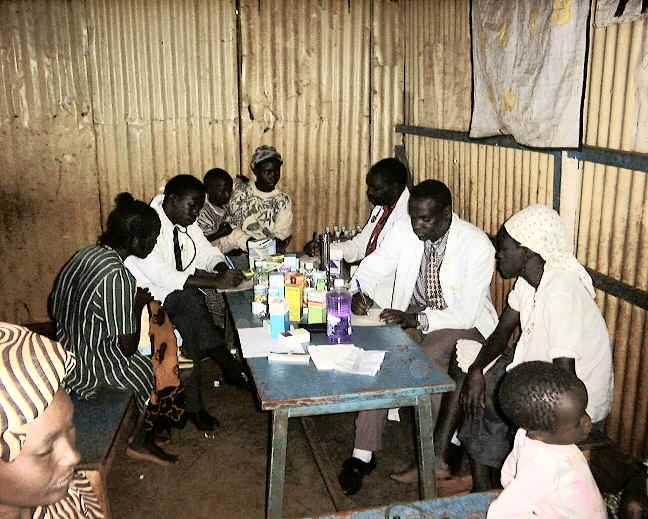
Attendance
As mentioned above, medical attention is very
expensive; worse so for the poor folks at Mji wa Huruma. This therefore explains why such free services will always
attract huge gatherings. The residents of the village are vulnerable to
ailments owing to surroundings and also eating habits. The camp was scheduled
to begin at 9.00 a.m. However enthusiastic members of the community and
surrounding areas started arriving as early as 8.00 a.m. and patiently waited
in queues. There were two different queues; those with dental problems and the
rest with general health cases. Those young enough just stood to give room for
the elderly.
Medical fraternity
There were about 30 medical personell. Majority
were students from Nairobi University`s Dental Unit. These dealt with dental
problems while the rest who were qualified and reputable doctors from Kenyatta
National Hospital tackled all other ailments.
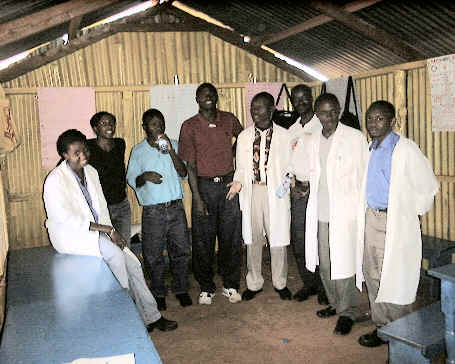
Indications from the two rows indicated that
there were more people with dental problems than any other diseases.
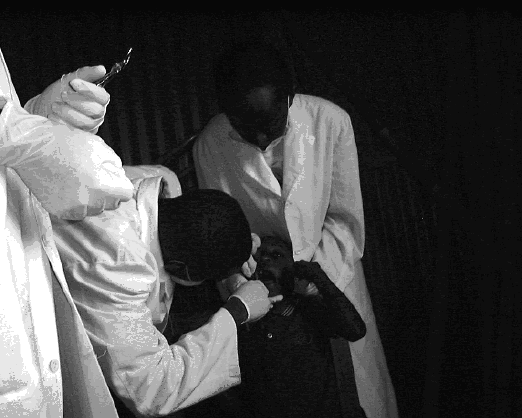
All in all more than 300 patients were attended
to. All got prescriptions where applicable as there were enough of these while
others were refered to major hospitals for advanced treatments. Those with eye
problems were refered to the famous Kikuyu Eye Unit while the rest of the ailments were refferd
to Kenyatta National Hospital.
Symposium on hygiene
After everybody was attended to,
experts held a talk on issues regarding hygiene for mothers. This was crucial
as they realised some of the health problems were result of lack of knowledge of simple precautionary steps. First they
were advised on the need for cleanliness in all aspects, proper (balanced)
dieting and oral health. At the end of it they were given essential stuffs to
set them off. These included sanitary soaps and detergents, toothpastes and
foodstuffs.
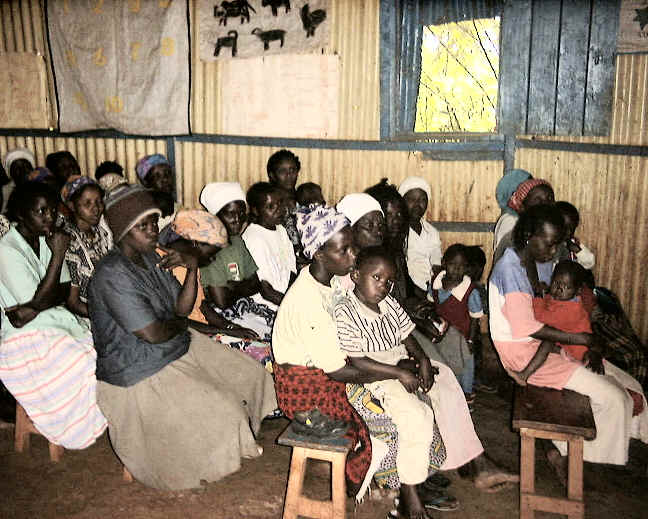
We thank the Karura Community Chapel and all the doctors who participated
and welcome them all back at a later date. |
| The
other side of Nairobi |
February 28, 2002
|
|
The
German School students had their projects in the week starting 4th-7th
February. They were expected to write project reports at the end of the week.
The theme for this year’s project was “The other side of Nairobi”.
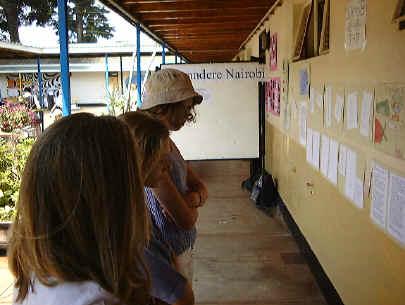
The
aim as per the theme was to expose these students to the kind of lives people
live away from the kind of lifestyles they (students) lead. They live
comfortable and sometimes lavish lives oblivious of what less endowed Kenyans
undergo in their ordinary lives. These therefore meant the students visiting
mainly projects within informal settlements popularly referred to as slums.
Among
the projects they were to visit was the kindergarten at Mji wa Huruma; which
is a project of Matumaini Youth Group. The students were to visit other
projects in Nairobi and were therefore divided into three groups of four
students. Two of the groups visited the village alternately. The first was in
the village on Monday and Tuesday (4th and 5th February 2002) while the other
visited the village on Wednesday the 6th. Both the two groups did some work
(drawings and clay moulding) with the kids at the nursery school. They also
went round the village. The students had real experience with the kind of
lives we live in the slums. Some really were interesting to guide through the
shabby homesteads villagers call homes. At some point, we visited an old man
who felt fascinated enough to request these students try and get some willing
people in German to help him pay school fees for his son who is in Secondary
School (he has three others in Primary School). They were sincere with him in
admitting that it is not so easy to get people undertake such kind of
sponsorships but all the same were optimistic that this could yield something
as they hoped to talk it with some friends back in German.. We just hope some
help could be gotten.
|
| Keeping the Village Clean |
January 30, 2002
|
|
In keeping up with our
goals (keeping the village clean), we continue to hold our monthly clean-up
exercise every last Saturday of the month. This month (January), we had the
event on th 26th. In the past one month, The German Lutheran Church
had donated funds to replace most of our tools most of which had worn out. We
purcased a few tools with the funds in late December and had promised to
utilise the tools as soon as possible. This we did by holding a clean-up
exercise in January. After collecting all the rubbish, we dumped them in
dug-up pits and set them on fire. A representative from the Germany community
Mrs. Karin Wolf, also a teacher at the German School participated. As usual,
we mobilised youngsters we use in the football projects. This helps instil a
sense of responsibility in them.


|
| Fight
against AIDS |
December 20, 2002
|
|
 AIDS
is among the highest ranked threats to the Africa People. Together with other
calamities as droughts, famine and civil wars, the disease is claiming too
many lives and threatens so many others. In Kenya, the scourge is responsible
for at least 700 lives daily and has been declared a national disaster. Among
the Provinces worst hit are Nyanza, Coast and Western. AIDS
is among the highest ranked threats to the Africa People. Together with other
calamities as droughts, famine and civil wars, the disease is claiming too
many lives and threatens so many others. In Kenya, the scourge is responsible
for at least 700 lives daily and has been declared a national disaster. Among
the Provinces worst hit are Nyanza, Coast and Western.
The
trends in these areas have been attributed to several reasons among them
primitive cultural practices that abet the spread as: female circumcission,
wife inheritance, early (forced) marriages etc.
There
has been declared total war against the epidemic. Nairobi Para-Legal Network
(NPLN), an arm of Matumaini Youth and whose main objective is creation of
civic awareness has embarked on a serious campaign to create awareness on the
hazards. We conduct seminars monthly at the local Catholic Church.
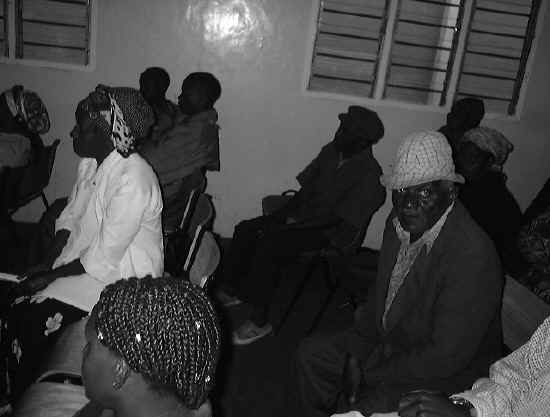
The
international community also has come out strongly in supporting the fight
against HIV/AIDS. Most countries have pledged both financial and material
support. All avenues have been mobilised and effectively used in Kenya. There
are posters all over, publications, and hand-outs, T-shirts and caps bearings
messages. The electronic media has also contributed immensely in giving out
warning messages.
The
German Embassy went an extra step and used sports fora to pass the necessary
messages which were printed in sports wear. The Embassy has donated trophies
and sports equipment (football) that are given out during these sports events.
In December 2001, the embassy organised an annual soccer tournament for boys
aged 14yrs and under. Among participating teams were German School, Italian
School, French School, Swedish School, SoS Village and Matumini. We
participated in the tournament for the first time. In the one day tournament,
teams were divided into two pools (three teams each to play two matches before
proceeding to the semi-finals) where we were pooled against both French School
and SoS Village. We beat SoS Village to reach the semis where we eliminated
the hosts German School. In the finals we
beat French School (2 goals to nil) to win the trophy which defending campions
St. Austins Academy were unable to defend. The tournament being played
annually will be on again later next year in December (2002) with Matumaini
Youth as defending champions.
|
| New class at Lower
Huruma Day Nursery School |
March 7, 2001
|
|
 Matumaini Youth members with funds from
the Nordic Christmas Bazaar collections constructed a new class at the local
nursery school. The bazaar, an annual event held at Swedish School, Nairobi is
conducted by residents from the Nordic countries, namely Sweden, Norway, and
Denmark working in Kenya. Previously, funds from similar collections have been
used to rehabilitate the old and tattered classes which were originally of
earthen floor. The work at the new class was carried out over the Christmas
holidays. The new class was necessary as the population for school-going
children continues to rise. The construction was carried out in three phases.
The first phase was the foundation works. This involved digging of
trenches and levelling of the ground. Next, the posts and the timbers were put
up and finally the structure was erected. The new class has new furniture.
There is also a separate room where the teachers can store their things. The
same room will also be used by members of the youth group to carry out
computer lessons for members of the community to enable them participate fully
in building the web-site. This makes it necessary for the class to be
connected to the mains as computers can only work with electricity. Matumaini Youth members with funds from
the Nordic Christmas Bazaar collections constructed a new class at the local
nursery school. The bazaar, an annual event held at Swedish School, Nairobi is
conducted by residents from the Nordic countries, namely Sweden, Norway, and
Denmark working in Kenya. Previously, funds from similar collections have been
used to rehabilitate the old and tattered classes which were originally of
earthen floor. The work at the new class was carried out over the Christmas
holidays. The new class was necessary as the population for school-going
children continues to rise. The construction was carried out in three phases.
The first phase was the foundation works. This involved digging of
trenches and levelling of the ground. Next, the posts and the timbers were put
up and finally the structure was erected. The new class has new furniture.
There is also a separate room where the teachers can store their things. The
same room will also be used by members of the youth group to carry out
computer lessons for members of the community to enable them participate fully
in building the web-site. This makes it necessary for the class to be
connected to the mains as computers can only work with electricity.
However, the class doesn’t have a
teacher yet as we’ve not found people kind enough to pay for the salaries.
Still, it is desirable to initiate a feeding programme to provide some meals
to the kids as some do come to school without any. The school being in one of
the poorest informal settlements where majority of parents are either casual
labourers or unemployed, explains why some of these children come to school
without enough food and clothing. This greatly hampers their learning speeds
and abilities and hence the need for supplementary meals and free uniforms. We
appeal to well wishers out there to come forward and assist these kids.
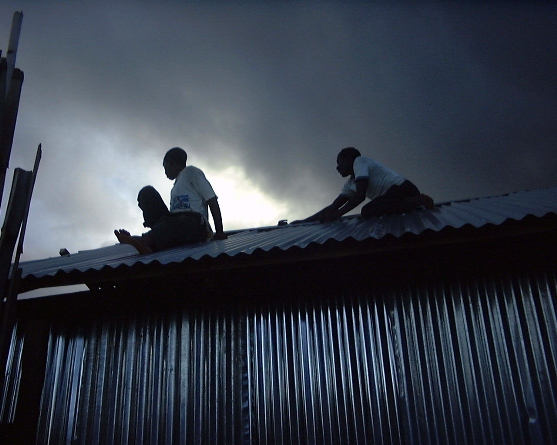
|
|
Nairobi Urban Land Campaign |
July 6, 2000
|
|
Muungano wa Wanavijiji has launched an intensive campaign
on urban land in Nairobi. The main aim is to agitate more than ever before
that people be allowed to own or be allocated permanent settlements. The
campaigns were conducted from door to door. Communities are grouped according
to the Divisions of Nairobi known as zones(these are Kasarani, Starehe,
Kamkunji, Makadara, Embakasi, Athi River, Langata, Dagoretti and Westlands)
and Mji wa Huruma is in Westlands Zone.
In Westlands Zone, the campaign kicked off on Tuesday
26 May. The villages targeted were Kaptagat, Kibagare, Kileleshwa, Soweto
Spring Valley, Westlands open air market, Dennis Pritt Road, Waruku, Mwaka,
Ndumboini, Jericho and Mji wa Huruma. All were visited save for Soweto
and Westlands market.
A committee of eight carried out the campaign. After three
days an evaluation was carried out.
The committee visited Mji wa Huruma on Sunday 28 May 2000.
As usual, we went from door to door. At the end of the day, the residents
of the village promised to support the campaign. This was to be implemented
by a committee that was to be formed within two weeks.
After the campaigns, each zone was to hold conventions
to bring together people from all the villages visited to come up with
a plan of action. In Westlands, the convention was held on Saturday 24
June at St. Joseph Catholic Church, Kangemi. Each of the 10 communities
targeted was to send 20 representatives.
Out of a total of 200 participants expected however, only
37 turned up. Mji wa Huruma was represented by 3 people. The low turnout
was due to a combination of setbacks:
There was short notice as mobilisation was carried out
only three days prior to the event.
-
There was uncertainty as to whether the launch would actually
take off (it was initially scheduled for Saturday 17 June).
-
There was also uncertainty as the venue had not been officially
booked (due to delay of funds).
-
Those from far off places could not afford the fares (esp.
from Mji wa Huruma).
Despite the low turnout, the launch was a success.
The function started at 10.00a.m. with a word of prayer.
This was followed by self introductions. Next was a brief overview of the
campaign by Mwangi Mutiso of Westlands market. Wamuti Gachugia from Soweto
Spring Valley was next with a history and background of the struggle and
formation of Muungano wa Wanavijiji. He also gave an account of success
stories and activities carried out in different communities facing eviction.
Among them was Mt. View (along Waiyaki Way) whose residents were compensated
with a larger farm elsewhere.
The next session was a representative (one from each village)
to give an account of what they had done in their respective communities
in propagating the campaigns.
At the end of the launch, participants agreed to:
-
Come up with village committees to implement the campaign
in their respective villages.
-
Those committees to meet on 15 July 2000 to elect a zonal
committee to oversee the activities at the zonal level.
-
Each village to send representatives to official launch on
1 July 2000 at Ufungamano House
|
|